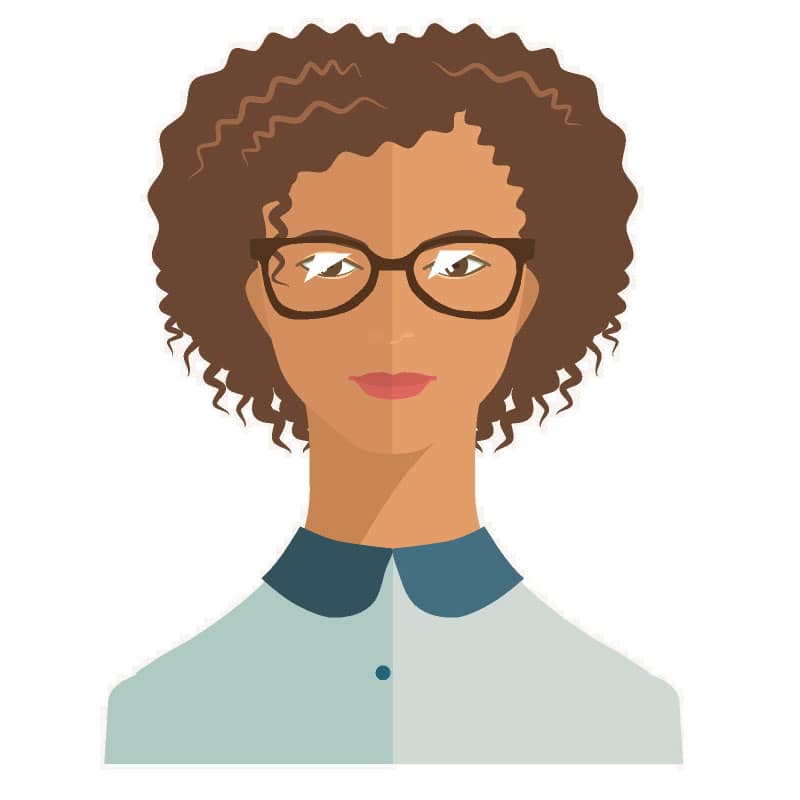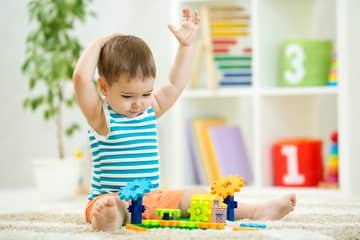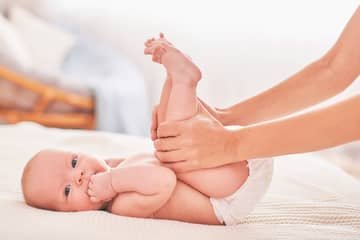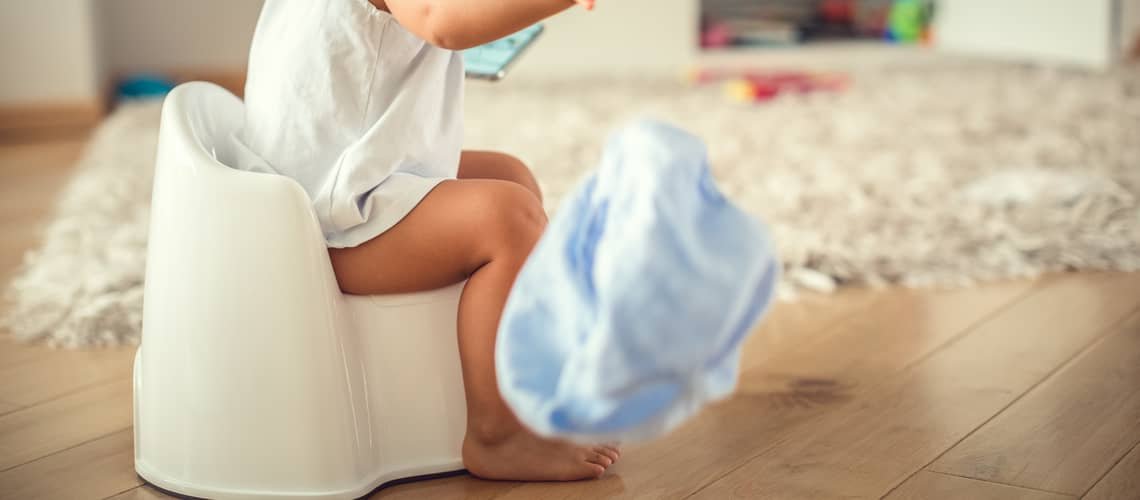
How to potty train a child in 7 days. Advice if a 2-year-old child does not want to sit on the potty
Teaching a child to go to the potty can be compared to a sports discipline, because even going to the potty requires training. Parents who have already gone through the process of changing a baby's diaper know that not everything always goes smoothly. If you could get rid of diapers for good within a week, wouldn't that be fantastic? How to potty train a child in 7 days? There are many instructions available on the Internet today on how to change a baby's diaper, or how to potty train a child. We will tell you how to wean a child from diapers and you will also learn when to start potty training a child.
Potty training requires proper timing. Starting too soon can cause your child to go potty and not be friends with him anymore. On the other hand, if you start late, learning can be even more challenging. Weaning a baby is a challenge and goes hand in hand with potty training. First of all, when changing diapers and potty training, a parent must arm himself with a dose of patience and balance. Impulsive reactions, shouting, threats or punishments are not appropriate. Although there is no exact guide or manual that will apply to all children, perhaps these rules and principles will help you potty train your child faster.
Potty training and a mature child - when to start?
The exact month or age when you should start potty training your child is not fixed. It can be based on statistics, recommendations of pediatricians and general experience of parents. Around 18-24 months, the child begins to realize the need to defecate, pee and poop. Potty training should not be rushed so that the child does not develop an aversion to the potty.
However, this does not mean that you cannot introduce the child to the potty even earlier. For example, try reading him stories about the potty, play interesting educational videos, songs, sit him on the potty sometimes and explain to him what it means to poop or pee. Talk to him about the fact that there is a potty for peeing and pooping. The first acquaintances are short. If the child does not want to sit on the potty, do not force him. Empathetic communication between a parent and a child is important.
More important than age is the maturity of the child. It is necessary for the child to understand the essence of what potty training means. If you want to wean a child from diapers, he must have mastered certain laws and have certain expressions that indicate that you can start potty training.
- The child should be able to stay dry for at least two to three hours during the day (a sign that he is in conscious control of his bladder and sphincters) or wakes up with a dry diaper.
- He is interested in the potty or watches you go to the toilet and is interested in learning.
- Controls and differentiates basic instructions and concepts - pee and poop. He should know the difference between peeing and pooping.
- He can express his need with gestures, signs or words.
- He can undress (calmly and with help) and sit on the potty.
- A wet diaper makes the child uncomfortable.
- He shows interest in wearing briefs or panties and tends not to wear a diaper.
How to teach a 2-year-old child to poop or pee on the potty depends mainly on what role the parent plays in this process, and it is not necessary to fixate only on the age itself when learning.
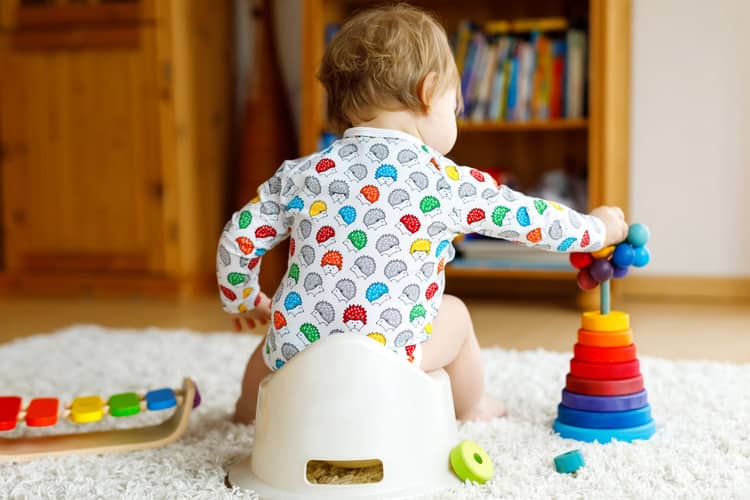
How to teach a child to go to the potty in 7 days - habits and ritual
If we assume that your child has acquired the above-mentioned habits and has the necessary maturity to wean from diapers, it is time to start making going to the potty a ritual. This method of changing diapers works very effectively for some children, but for other children, this transition period definitely requires more than a week or even a month.
- Provide a stable environment, set aside enough time and put the child on the potty regularly at certain time intervals so that he can associate the purpose of the potty and its use.
- Do not start learning when you are on vacation or when your child is about to start kindergarten, time pressure is not welcome.
- When getting to know the potty, you can start by sitting the child on the potty dressed for only a short time (1 to 2 minutes) and explaining to him what the potty is for.
- Subsequently, it is advisable to practice sitting without pants and a diaper, naked. Always explain to the child that the diaper will no longer be needed, because the potty. So skip the diapers and give him only classic clothes (ideally ones that can get dirty in the event of an accident). Keep diapers to a minimum, e.g. just for sleeping. Diapers for sleeping at night are generally tolerated up to 5 years.
- Going to the potty must become part of the day. After waking up, the child tends to pee, put him on the potty, do the same after eating or before going to bed.
- It doesn't matter if the child doesn't have time or defecates right after getting up from the potty. Do not scold him, do not sin, do not punish him. Express sadness that it's a shame it didn't work out. Through the accident, the child creates a relationship between comfort in dry clothes and discomfort in wet clothes.
- Emphasize to the child that he asks about the potty and you ask him the same way. “Don't you need to go pee? Don't you need to go poop?” It will definitely happen that the child will not always tell the truth or will not estimate his needs, but you have to expect that.
- Whenever the child succeeds in doing what he needs, praise him, applaud him, motivate him, calmly reward him and rejoice with him. It creates a positive association.
- Separate the process of peeing and pooping. The child should independently fix both processes.
It is important that both parents, or other people who spend time with the child, adopt this system. In this way, you will avoid unnecessary complications that could cause confusion for the child, and instead of 7 days, potty training will take weeks or months. Longer time is not a problem, of course, and creating such rituals often takes longer than parents would like. On the Internet, you can find many extra instructions on how to potty train a child in 3 days. But if it doesn't work, don't despair. Patience is a must and it is still true that every child is different.
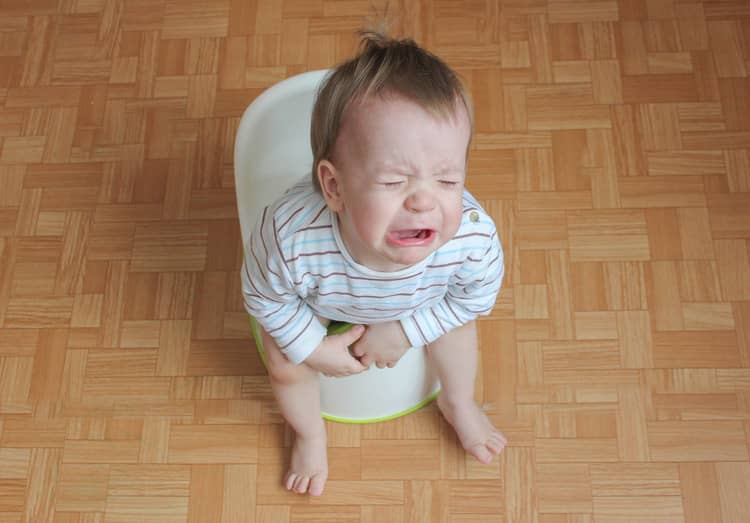
What if the child does not want to sit on the potty?
If the child cannot find his way to the potty, one option is to place the potty in the bathroom and take the child with you to the toilet. You sit the child on the potty, at first calmly even with a diaper, and talk about what you are doing right now, why you are doing it, the child will tend to imitate you. The second option is to buy a new potty. Yes, it can really work, beautiful color and with a favorite fairy-tale character. Some children do not get used to the potty, and in that case it is advisable to have a toilet seat for children at home, or reduction so that the child can sit comfortably on the toilet and not hurt himself or fall into the toilet bowl. Show them how to use the toilet, demonstrate it to them, children often want to be like "little adults" and they will imitate you.
How to teach a child to poop on the potty
Peeing in the diaper is already a thing of the past, but does the problem of the child having a big need on the potty persist? You are not the first or the last parent to solve such a problem. Usually, the path to pooping is as natural as to peeing on the potty, but if not, it requires patience. For a long time, the child was used to the fact that if he is wearing a diaper, he can suppress and does not have to hold anything back. Diapers must become a thing of the past, and with appropriate communication and motivation, it is necessary to explain to the child that even "poo" is okay in this place (on the potty).
The problem may be that you started potty training at an older age. What if a 3-year-old child does not want to use the potty and refuses it? Older children, around 2-2.5 years old, can form an emotional bond with the diaper, which can be a problem. The change is stressful for the child, so he prefers to wait until he gets a diaper in which to defecate. However, it is essential to communicate with the child and explain to him that the diaper is already big and that's what the potty is for. The second common problem with potty training is that the result is labeled as "poo" by the parent, like any other dirt. In this case, however, the success should be accompanied by praise and joy that the pooping was successful. By naming "kako" in the child, you give the impression that "kako" is bad (just like, for example, dirty hands from dirt or eating with your hands), and then the child may refuse the potty.
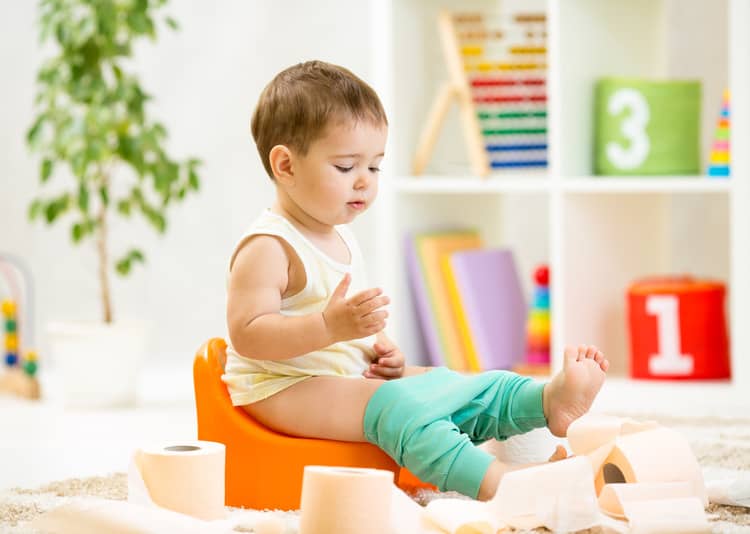
What not to do when potty training
A parent should be consistent, patient and maintain a positive attitude during potty training. If the child is getting to know the potty, do not let him sit on the potty for a long time, so that he does not think that it is just a special kind of chair.
Don't start learning when it's suddenly necessary. Are you going on vacation, will the child sleep over with grandparents or are you moving? Time pressure is definitely not a good time for diaper changing and potty training. A stable environment in which the child feels good and acquires the necessary habits that he will be able to apply elsewhere is important for the formation of habits.
Never punish a child if he does not have time to relieve himself or if he does it a few minutes after standing up from the potty. It is not good if you force the child to sit on the potty until he pees or poops, the child must not be under pressure or under stress, otherwise he will be afraid of the potty. The consequence of such inappropriate procedures is that the child refuses the potty. A common bad habit among children is that they learn to use the potty only at home and have a problem with it in other places. The reason is that the child has created a ritual in connection with a specific situation, watching TV, singing or reading a book. These rituals must be gradually limited so that the child understands that using the potty is a natural thing.
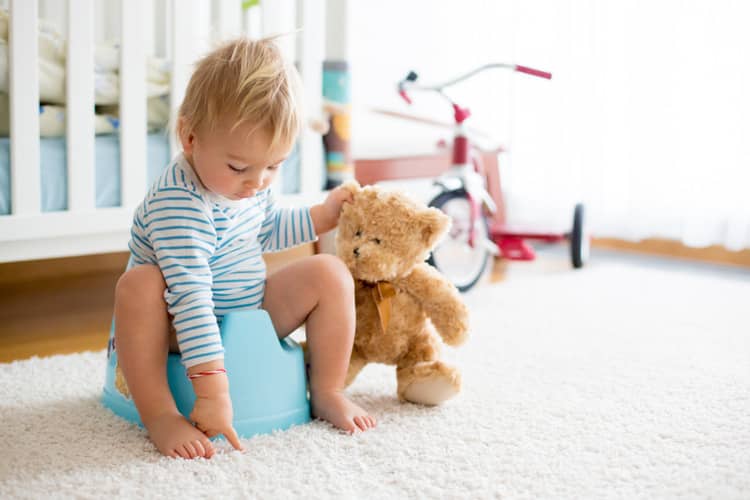
Changing diapers - diapers go sideways
It should be remembered that potty training is a proven method of diaper changing. It often happens that parents make a fundamental mistake in that they do not give the diaper to the child first, and then after a few accidents, they put the diaper on the child again. Such alternations and changes are not suitable for building potty training habits. The child may then refuse the potty and will wait until you give him a diaper in which he will defecate. It's okay if in the beginning you give the baby a diaper while sleeping or if we are going on a long trip. During the day, however, the child should be able to gradually ask for the potty and use it. Changing diapers can take several times longer due to the alternating use of diapers.
Experiences
Several mothers said in discussions that it is best to wait - the child will ask for the potty on its own. Some recommend patience when potty training, because the child has to understand that he can no longer pee when he thinks, but he has to ask for the toilet. It is ideal to potty train a child when it is warm, he can run around naked and use the potty himself when necessary. However, they all agreed that the child should not be forced and it is necessary to arm oneself with patience.
The most frequent questions - FAQ
Potty training a nightmare? It doesn't have to be that way. What are your experiences with potty training children? What strategy did you choose in your case? Did you use some of the advice and recommendations in our article? We will be very happy if you join the discussion below the article and contribute your tips and tricks that you have used. You will also help other readers. Each parent's experience may be different, and we would be more than happy to hear your opinions. If you have questions, feel free to write them to us in the comments, if possible, we will gladly advise you.
Is every child capable of potty training by the age of 3?
How to teach a child to ask to pee?
What to do when a child does not want to ask about the potty?
The child refuses the potty, what to do?
Pridať komentár
